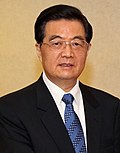3 December 2002 | ||||||||||||||||
36 Hong Kong deputies to National People's Congress | ||||||||||||||||
|---|---|---|---|---|---|---|---|---|---|---|---|---|---|---|---|---|
| Registered | 956 | |||||||||||||||
| ||||||||||||||||
| ||||||||||||||||
The election for the Hong Kong deputies to the 10th National People's Congress (NPC) was held on 3 December 2002. 36 Hong Kong deputies were elected by an electoral college.

